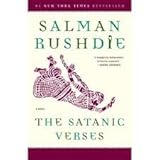But if Salman Rushdie's simply fantastic "fictional memoir," Joseph Anton, is any indication, I'll soon be checking out The Satanic Verses and everything else I can get my hands on. Yes, the book is long, but this is a must for lit-lovers and author groupies everywhere.
I'm not quite sure what was behind Rushdie's decision to write his memoir as fiction, perhaps fears of reprisal after all these years still run deep. You may not realize that Joseph Anton is the name under which Rushdie, his family, and various wives had to live during the long years of seclusion, a name chosen as a tribute to two favorite authors of his, Joseph Conrad and Anton Chekov.
One really cannot imagine the hardship and emotional strain that must have plagued Rushdie during those years yet he tells his story with relatively little bitterness and a great deal of honesty. The things we take for granted, the ability to own a home where you want to live, to see your children (not being able to see his beloved son when and where he wanted was one of the greatest burdens of his exile into oblivion), to travel, visit with friends, shop for a new suit, were all carefully orchestrated by the British home service, much like our FBI. All too often plans were nixed at the last minute for security reasons.
And though Rushdie became close with and truly appreciated the sacrifices made by many of his keepers, the British government was begrudging in its support and often let it be known that they believed he was a trouble maker who had brought on his own angst. Public opinion ran hot and cold, publishers acted cowardly, refusing to print a paperback copy of the verses, even though they had a contractual obligation to do so. A translator of his book was murdered. His ability to write freely was hamstrung and depression dogged him for many years.
Librarians, especially, who read this account of Rushdie's sacrifice for the belief in freedom of speech, will marvel that he had the will to continue the fight against censorship when it would have been so easy to cave in.
Authors from all over the world took stands for and against Rushdie and the fatwa and I want to read every book ever written by those who had the courage to speak and write against such an unspeakable wrong. South African Nadine Gordimer, in particular, was staunch in her unwavering friendship.
 The cause of all this trouble? Just a book. A volume of words sprung from an author's imagination. But such a dangerous thing! I'm so proud that I work in a book loving industry and in a library system whose former director, the person who hired me twenty years ago, put Lee Country squarely on the map when she had to defend a book from censorship. May we always have the courage to speak up for the glory of all words whether or not we agree with them.
The cause of all this trouble? Just a book. A volume of words sprung from an author's imagination. But such a dangerous thing! I'm so proud that I work in a book loving industry and in a library system whose former director, the person who hired me twenty years ago, put Lee Country squarely on the map when she had to defend a book from censorship. May we always have the courage to speak up for the glory of all words whether or not we agree with them.

No comments:
Post a Comment